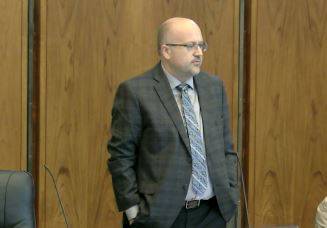Winnipeg city councillor Russ Wyatt has come under fire for referring to Bike Winnipeg delegates as “bicycle nazis” during a city committee meeting. This comment drew criticism from Bike Winnipeg Board Director Ian McCausland, who stated that Wyatt’s use of the word ‘nazi’ breached the city council’s code of conduct. The organization is calling for Wyatt’s removal from the committee, citing the need for respectful dialogue with all members of council. Wyatt defended his position, attributing the comment to frustration and later issuing a written apology for his poor choice of words.
Wyatt expressed his frustration with Bike Winnipeg’s advocacy for more bike lanes in the city, claiming that they only cater to a small number of cyclists. He argued that Nazi refers to a dictator telling people how to live their lives, implying that Bike Winnipeg is trying to dictate how people should get around the city. Bike Winnipeg responded by stating that the use of the term ‘nazi’ is offensive and harmful, particularly to those affected by Nazi Germany’s atrocities during the 1930s and 1940s. The organization plans to file formal complaints against Wyatt’s conduct with the city’s Integrity Commissioner.
Formal complaints against a councillor’s conduct are taken seriously and investigated. If it is determined that Wyatt breached his obligations, city council will deliberate on the potential reprisals he could face. Bike Winnipeg and councillor Janice Lukes of Waverley West have both indicated that they will be filing complaints against Wyatt. The use of offensive language in a public meeting without immediate censure is concerning, and the city council will need to address this issue appropriately.
The controversy surrounding Wyatt’s comments highlights the importance of maintaining respectful dialogue and conduct within city council meetings. While political differences are expected, using inappropriate language can harm relationships and hinder progress on important issues. Both Wyatt and Bike Winnipeg have acknowledged the need for a more civil discussion moving forward, with Wyatt issuing an apology for his choice of words. It remains to be seen how the city council will respond to the complaints filed against Wyatt and whether any further actions will be taken.
The situation also brings attention to the ongoing debate over transportation infrastructure in Winnipeg, particularly regarding the allocation of lanes for cars versus bicycles. The city has made efforts to create more bike paths, but disagreements remain on the impact of reducing lanes for cars. This dispute reflects broader discussions in cities around the world about promoting alternative modes of transportation to reduce congestion and emissions. Moving forward, it will be crucial for city councillors and advocacy groups to find common ground and work towards a sustainable and inclusive transportation system in Winnipeg.
In conclusion, the controversy surrounding Russ Wyatt’s comments during a city committee meeting has sparked debate and criticism within the Winnipeg community. The use of offensive language such as ‘nazi’ in a public setting is concerning and has led to calls for Wyatt’s removal from the committee. The response from Bike Winnipeg and the potential filing of complaints by other councillors indicate a commitment to upholding standards of conduct within city council meetings. Ultimately, the incident serves as a reminder of the importance of respectful communication and collaboration when addressing complex issues such as transportation infrastructure in urban areas. It is essential for all parties to engage in constructive dialogue and find common ground to move towards a more sustainable and inclusive city.


